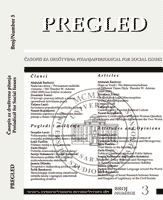Pitanje definiranja terorizma u međunarodnom pravu
The Issue of Defining Terrorism in International Law
Author(s): Maja SahadžićSubject(s): Law, Constitution, Jurisprudence
Published by: Univerzitet u Sarajevu
Keywords: terrorism; international law; definition
Summary/Abstract: The First attempt at defining terrorism in international law is related to the 1937 Convention for the Prevention and Punishment of Terrorism, which was adopted by the League of Nations. In the following years the UnitedNations, the specialized agencies of theUnitedNations in particular, work on defining this phenomenon by adopting international documents and defining international legal instruments for combating and limiting terrorism.However, those activities aremore or less efficient, because they are usually reduced to definitions that differ fromcase to case. The reason for this is that terrorism as a concept relates to individual norms in international law referring to vessel safety, chemical and biological weapons, espionage, sabotage etc. This is not all. In general, terrorism reflects the interests of those defining it, and, in most cases, terrorism is defined by each state individually, in its own way. Therefore, one of themost important questions is who should have the authority for defining terrorism? Should it be states, international organizations (like theUnited Nations) as subjects of international law or someone else? Consequently, the matter of research needs to be directed towards defining and understanding terrorism in international law, which will help understand this phenomenon, but also indicate potential guidelines and solutions that would result in the harmonization, as well as the adoption of a universal and broadly accepted definition of terrorism in international law.
Journal: PREGLED - časopis za društvena pitanja
- Issue Year: L/2009
- Issue No: 2
- Page Range: 149-170
- Page Count: 22
- Language: Bosnian

